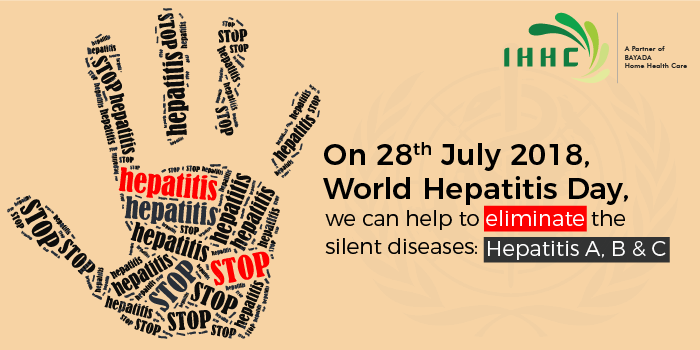Is there a need for home healthcare in India?
According to the World Health Organisation(WHO),In South-East Asia, 100 million people are currently estimated to be living with hepatitis B, and 30 million with hepatitis C. In India, viral hepatitis is now recognized as a serious public health problem. It places a huge social and economic burden on the affected individual, the family, as well as the health system.
In India, as per latest estimates, 40 million people are chronically infected with hepatitis B and six to 12 million people are chronically infected with hepatitis C. HEV is the most important cause of epidemic hepatitis, though HAV is more common among children. Most acute liver failures diagnosed are attributable to HEV.”
Be-aware of the signs and symptoms
An inflammatory condition of the liver, Hepatitis is commonly caused by a viral infection – however that doesn’t eliminate other possible causes of hepatitis…including autoimmune hepatitis (a disease that occurs when your body makes antibodies against your liver tissue),
And is a secondary result of:
- Medications
- Drugs
- Toxins
- Alcohol.
Where is the liver and what does it do?
The liver is located in the right upper area of the abdomen and it performs many crucial functions that affect metabolism throughout the human body, including:
- Bile production - essential for efficient digestion
- A filtration systems for toxins
- Excretion of bilirubin (a by-product of broken-down red blood cells), cholesterol, hormones, and drugs
- Breaking down carbohydrates, fats, and proteins
- Activating enzymes - specialized proteins essential for various bodily functions
- To store glycogen, minerals, and vitamins (A, D, E, and K)
- The synthesis of blood proteins and clotting factors
Treatment options will depend on the type of hepatitis that needs treating. Some forms of hepatitis can be treated through immunizations and lifestyle precautions.
Types of viral hepatitis
Hepatitis A, B, C, D, and E, are all viral infections of the liver.
Hepatitis A is an acute, short-term disease. Hepatitis B, C, and D are generally ongoing and chronic. Hepatitis E is usually acute and could be particularly dangerous for pregnant women.
Hepatitis A
Caused by an infection of the hepatitis A virus (HAV), its commonly transmitted by the consumption of food or water contaminated by faeces from people infected with the hepatitis A virus.
Hepatitis B
Transmitted via contact with infectious body fluids, including blood, vaginal secretions or semen, containing the hepatitis B virus (HBV). Contaminated syringes, sex with infected partners, or sharing razors with an infected person – all increase the risk of getting hepatitis B. It’s estimated by the Center for Chronic Diseases (CDC) that 350 million people, worldwide, are living with this chronic disease.
Hepatitis C
Caused by the hepatitis C virus (HCV), this type of hepatitis is transmitted through direct contact with infected body fluids, generally through injection drug use and sexual contact.
Hepatitis D
A serious liver disease caused by the hepatitis D virus (HDV), this type is also known as Delta hepatitis. HDV is contracted through direct contact with infected blood. A rare form of hepatitis, this only occurs in conjunction with hepatitis B infection because the hepatitis D virus can’t multiply without hepatitis B also being present.
Hepatitis E
A waterborne disease caused by the hepatitis E virus (HEV), this form of the hepatitis virus is mostly found in areas with poor sanitation and is a result of ingesting faecal matter that has contaminated the water supply. While it is generally uncommon in the more developed parts of the world, cases of hepatitis E have been reported in the Middle East, Asia, Central America and Africa.
Symptoms of hepatitis
Infectious forms of hepatitis that are chronic, such as hepatitis B and C, may not have symptoms at the start. In fact, symptoms may not occur until the damage affects liver function. Signs and symptoms of acute hepatitis appear quickly. These include:
- Fatigue
- Flu-like symptoms
- Dark, almost orange, urine
- Pale stool
- Abdominal pain
- Loss of appetite
- Unexplained weight loss
- Yellow skin and eyes, which may be signs of jaundice
Since chronic hepatitis develops slowly, these signs and symptoms may be too subtle to notice at first.
Hepatitis treatment
Treatment options depend on the type of hepatitis and whether the infection is acute or chronic.
Hepatitis A
This type usually doesn’t require treatment because it’s a short-term illness. Bed rest is recommended if symptoms cause a great deal of distress. Following the doctor’s orders, for hydration and nutrition in cases of vomiting and loose motions, is essential.
Hepatitis B
Acute hepatitis B doesn’t require specific treatment. Chronic hepatitis B is treated with antiviral medications. Treatment for chronic hepatitis B requires regular medical evaluations and monitoring. This type of hepatitis B can be prevented with vaccinations.
Hepatitis C
For both acute and chronic forms of hepatitis C, antiviral medications are used as treatment. People who develop chronic hepatitis C are generally treated with a combination of antiviral drug therapies.
Hepatitis D
There is no antiviral medications for the treatment of hepatitis D at present. Hepatitis D can be prevented by getting vaccinated for hepatitis B, as being infected with hepatitis B is essential for hepatitis D to develop.
Hepatitis E
At present, there is no specific medical therapy available to treat hepatitis E. People with this type of infection are normally advised to get adequate rest, stay well hydrated, get enough nutrients, and avoid alcohol.
Autoimmune hepatitis
For the early treatment of autoimmune hepatitis, corticosteroids, like prednisone or budesonide, are vital. They work for about 80 percent of people with this condition.
How to prevent hepatitis
Practicing good hygiene is key to preventing hepatitis A and E. As far as possible avoid:
- Local, unfiltered water
- Ice made from unfiltered water
- Raw or undercooked shellfish
- Raw fruits and vegetables
Hepatitis B, C, and D, contracted through contaminated blood, can be prevented by bot sharing:
-
- Drug needles
- Razors
- Toothbrushes
- Avoiding spilled blood
Vaccines
The use of vaccines is the best method of preventing hepatitis. Vaccinations are available to prevent the development of hepatitis A and B.
Call to action on World Hepatitis Day 2018
Viral hepatitis is one of the biggest global threats of our time. It causes 134 million deaths annually. Causes two in every three liver cancer deaths. Worldwide, 300 million people are not aware that they are living with viral hepatitis. Without finding the undiagnosed and linking them to care, millions will continue to suffer, and lives will be lost. On World Hepatitis Day, 28 July, let us all commit ourselves to taking action, raising awareness and joining in the quest to find the “missing millions”. And, preventing many more from going down the same path.




